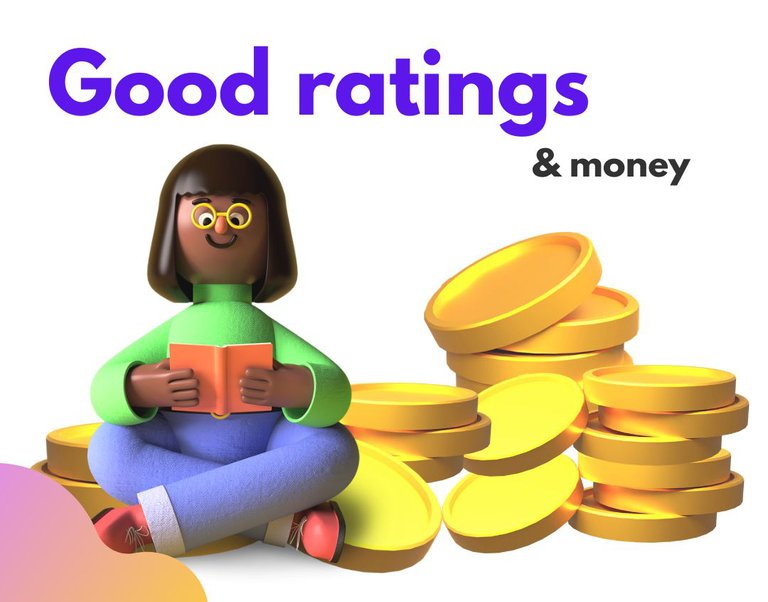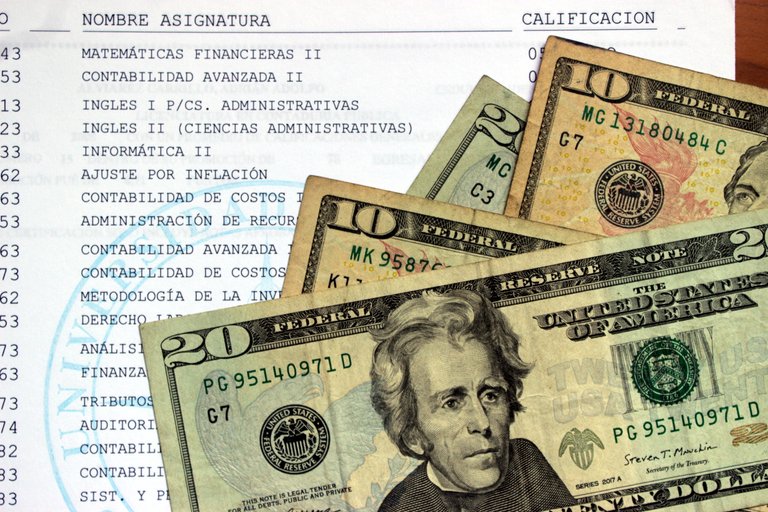If good ratings were money... || Si las buenas notas fueran dinero... [W118 E2]
The idea of rewarding students with the highest grades monetarily might be appealing to many people, but perhaps many would agree that this already exists in a material form (because money is also matter) but on another level. But perhaps many would agree that this already exists in a material form (because money is also matter) but on another level. What do we mean by that? And also, what repercussions could materializing this type of incentives with money effectively have? I want to give my opinion. Please join me.

First of all, I believe that this thing of materially rewarding the best in the class has been around for a long time, at least at the family and academic level.
During my elementary school years I constantly heard that my classmates were promised material things by their parents if they passed the year with good grades, even just for passing, no matter the grade. At the time I didn't understand the purpose. My mother never did that with me. The desire I had to learn and be a good student was a motive born within me, not out of longing for an external reward. Some might call it bribery.
With this we can see that some parents were already rewarding academic brilliance in their homes in a material way. Wasn't it money? True, but they were giving something physical that was bought with money, and that the child also associated with a quantitative worth, and would probably protect it (to a greater or lesser extent) understanding that there was a cost.
In a second case, the institutions also provided scholarships for those who achieved some level they had set. So not everyone made it. That was also a motive for many to seek to achieve to be in the top of students in that grade.
"Aha! But that's not money either. " True. But often those scholarships were offered to study at larger, private, famous and expensive educational institutions. But it wouldn't cost those winners anything. So what difference would it make if they were given a check that would pay for their entire degree until the end? In practice, a scholarship serves as money.

For all that, in my opinion, it already rewards academic brilliance in a material way. Now, what if now money is used directly, putting it in the hands and wallets of students?
In principle, it is nice to think that a good student will be able to have a little extra money to cover his basic needs while he is on his way to graduation, and why not, even treat himself and buy something nice. But it may not work out so harmoniously in many cases.
It's easy to turn into business in some places where money is present, so cash incentives could diffuse the motives for why you undertake the studies. Are you really doing it to learn, progress and apply what you are being taught, or simply to earn the money? We can't lump everyone together, but those who are tempted by money to be at the top of their class will struggle to avoid employing dishonest methods for those assessments where they find it difficult to achieve top marks. Will they be able to win in that struggle?
Also, cash rewards could cause another dilemma: would the same amount of money be used for all majors and subjects? Think about it: imagine someone who got the highest grade in a subject called Basic Mathematics I, and the same semester there was another who got the highest grade in a subject called Advanced Mathematics III, located six semesters higher in the curriculum. Would you approve of both having the same amount as an incentive? If we give them both the same amount, would we be saying that with the same effort and time they can achieve that maximum achievement in one subject and the other? It is an interesting question.
And finally, I think there could also be a repercussion in those who evaluate and grade. Let's be honest, we are human beings, with feelings, backgrounds, prejudices, preferences.... ...and if we are careless, some of those things could affect our judgment in evaluating students. Will we prefer someone because they are in some disadvantaged position monetarily in order to get the incentive to them? At the same time, what if we have to evaluate the child of our friend, or of someone who has wronged us? Undoubtedly, this type of situation raises even more the need for the evaluator to be objective in his criteria. Can this be achieved?

In conclusion, I think that starting to incentivize someone for their good academic performance with direct money leaves more questions than answers, because the most optimistic will say that it will help a lot to the educational system and growth of the individual, but the most negative will think about the possible vices that could infiltrate the system and evaluations. It seems that there will be only one way to find out: implement it. In the meantime, let's enjoy the indirect money incentives we talked about. See you next time!



La idea de recompensar monetariamente a los estudiantes que saquen las máximas calificaciones pudiera ser algo atrayente para muchos. Pero tal vez muchos concuerden de que ésto ya existe de forma material (porque el dinero también es materia) pero en otro nivel. ¿A qué nos referimos con eso? Y también, ¿que repercusiones podría tener efectivamente materializar éste tipo de incentivos con dinero? Quiero opinar. Por favor, acompáñame.

Primeramente, creo que ésto de premiar materialmente al mejor de la clase ya existe desde hace tiempo, en al menos a nivel familiar y académico.
Durante mis años en la escuela primaria constantemente escuchaba que a mis compañeros sus padres le prometían cosas materiales si pasaban con buenas calificaciones al año, incluso, sencillamente por pasar, no importa la nota. En ese momento no entendía el propósito. Mi madre nunca hizo eso conmigo. Las ganas que tenía de aprender y ser un buen estudiante era un motivo que nacía en mi interior, no por añorar una recompensa externa. Algunos podrían llamarlo soborno.
Con ésto podemos ver de que algunos padres ya estaban recompensando la brillantez académica en sus hogares de forma material. ¿No era dinero? Es verdad, pero le otorgaban algo físico que se compró con dinero, y que el niño asociaba también con una valía cuantitativa, y probablemente lo protegería (en mayor o menor medida) entendiendo que había un costo.
En un segundo caso, las instituciones también ofrecen becas para aquellos que logren algún nivel que ellos hayan establecido. Así que no lo lograban todos. Eso también era un motivo para muchos buscar alcanzar estar en el top de estudiantes de ese grado.
"¡Aja! Pero eso tampoco es dinero." Es verdad. Pero con frecuencia esas becas eran ofrecidas para estudiar en instituciones educativas más grandes, privadas, famosas y costosas. Pero a esos ganadores no les costaría nada. Entonces, ¿qué diferencia habría si le dieran un cheque con el que pagarían toda su carrera hasta el final? En la práctica, una beca sirve como dinero.

Por todo eso, en mi opinión, ya se recompensa la brillantez académica de forma material. Ahora, ¿qué hay si ahora se usa dinero directamente, poniéndolo en las manos y billeteras de los estudiantes?
En principio, es agradable pensar de que un buen estudiante logrará tener un dinerito extra para poder cubrir sus necesidades básicas mientras sigue dirigiéndose a alcanzar su graduación. ¿Y por qué no? También darse algún gusto y comprarse algo bonito. Pero tal vez no se cumpla así de armónico en varios casos.
Es fácil que se transforme en negocios algunos lugares donde está presente el dinero, así que los incentivos en metálico podrían difuminar los motivos por los que emprende los estudios. ¿Lo está haciendo de verdad por aprender, progresar y aplicar lo que se le enseña, o sencillamente por ganarse el dinero? No podemos meter a todos en un solo saco, pero aquellos que sean tentados por el dinero a ser los mejores de su clase tendrán que luchar con evitar emplear métodos deshonestos para aquellas evaluaciones donde se les haga difícil lograr la máxima calificación. ¿Podrán vencer en esa lucha?
También, las recompensas en metálico pudieran provocar otro dilema: ¿se usaría el mismo monto de dinero para todas las carreras y materias? Piénsalo: imagina a alguien que sacó la nota máxima en una materia llamada Matemática Basíca I, y el mismo semestre hubo otro que sacó la nota máxima en una materia llamada Matemática Avanzada III, ubicada seis semestres más arriba en el pensum. ¿Verías con aprobación que ambos tengan el mismo monto como incentivo? De otorgarle a ambos el mismo monto, ¿estaríamos diciendo de que con el mismo esfuerzo y tiempo se puede lograr ése máximo logro en una materia y otra? Es una interesante cuestión.
Y finalmente, creo que también podría haber una repercusión en los que evalúan y califican. Seamos honestos, somos seres humanos, con sentimientos, antecedentes, prejuicios, preferencias... ...y si nos descuidamos, alguna de esas cosas podrían afectar nuestro juicio a la hora de evaluar a los estudiantes. ¿Preferiremos a alguno porque se encuentra en alguna posición desfavorecida monetariamente a fin de que le llegue el incentivo a él? Al mismo tiempo, ¿qué hay si nos toca evaluar al hijo de nuestro amigo, o de alguien que nos ha hecho daño? Sin duda, éste tipo de situaciones eleven aún más la necesidad de que el evaluador sea objetivo en su criterio. ¿Se podrá lograr?

En conclusión, creo que empezar a incentivar a alguien por su buen desempeño académico con directamente dinero deja más preguntas que respuestas, porque los más optimistas podrán decir de que ayudará mucho al sistema educativo y crecimiento del individuo, pero los más negativos pensarán en los posibles vicios que pudieran infiltrarse en el sistema y evaluaciones. Parece que sólo habrá una forma de averiguarlo: implementarlo. Mientras tanto, disfrutemos de los incentivos de dinero indirecto que hablamos. ¡Hasta la próxima!
📚

FUENTES / SOURCES
Cover: Made with the free version of CANVAS || Portada: Hecho con la versión gratuita de CANVAS
Images: Shot with my Canon EOS Rebel t3i camera and edited with GIMP || Imágenes: Realizadas con mi Canon EOS Rebel t3i y editadas con GIMP
Banner: Made by me in GIMP with my own images and free resources from the site pfpmaker.com/ || Banner: Hecho por mi en GIMP con imágenes propias y recursos gratuitos del sitio pfpmaker.com/
Language: Post written in Spanish and then translated into English through DeepL || Idioma: Post redactado en español y luego traducido al inglés mediante DeepL/
Posted Using InLeo Alpha
I really love what you have done here, although your ending statement I don't agree with it, I prefer planning very well (Feasibility report) before attaining any policy.
We all have to work together to find a balance in this quest of ours, I guess that's the essence of this contest.
We weigh the good and the bad, with that unpredictable factor that we are human beings. Thanks for stopping by. Regards @jammyjtr